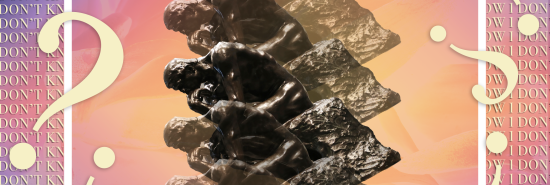
The many meanings of ‘I don’t know’
Rob Long
When I was younger, someone gave me some excellent advice. “If you don’t know the answer to something,” he said, “it’s perfectly OK to say so. Those three words — I, don’t, and know — would have saved the world an awful lot of trouble.”
It’s undeniably good advice, and I have tried to live by it. When it comes to the big questions — “Is there life elsewhere in the universe?” “Who won the Republican presidential debate?” “What exactly is almond milk?” — I find it easy to claim total ignorance. But even for smaller questions, “I don’t know” is a nearly perfect response. It’s the most flexible answer you can give.
TOURISTS ARE IN THE RIGHT PLACE
If you stress the first word in the series, the “I,” what you’re saying is basically this: “I don’t know, but maybe someone else, someone in the other room, can tell you.” The result is that you’re left alone and free of nettlesome inquiries. Total success.
If you stress the second word, the “don’t,” you’re saying something a bit more congenial. You don’t know the answer to the question, but it was a perfectly reasonable question to ask. It’s a wise man’s answer: It says, “I don’t know, but I have thought about it, and you were right to consult me.”
That last word, the “know” part, is the most tricky. If you say it with a sneer and a dismissive tone, you’re telling the questioner that he’s an idiot for asking. This comes off as rude, of course, but sometimes that’s the best and only way to get the barrage of questions to stop. Every teenager on Earth uses this specific delivery to convey to their parents that their questions are absurd and their presence is irksome.
But if you pronounce “know” in a slow and deliberate tone and finish the word with an upward inflection, what you’re saying is that while you do not know the answer, you’ve got some pretty solid ideas. I don’t know, but I do have thoughts. Who won the Republican presidential debate? I don’t know, but not Doug Burgum. See how that works?
For some reason, though, people resist using those words because they don’t want to appear ignorant, even though you can say “I don’t know” in a lot of ways that make the questioner the dumb one. In general, I guess, people just prefer to sound smart and in the know.
Yesterday, for instance, I was walking along the path to the beach when an elderly woman stopped me and imperiously demanded that I identify a certain type of flower that was growing along the way. I’m sure you know the type: straw hat cocked at an angry angle, lips pursed in a rictus of disapproval, one arm on her hip and the other pointing to the anonymous flower.
“What kind of flower is that?” she demanded in a tone of voice that implied that any flower she could not identify was a criminal suspect and any stranger walking by — me, in this case — was complicit in the crime. The correct answer from me was, of course, “I don’t know,” probably delivered with the “know” in the classic teenage way.
Instead, and I have no idea why I did this, I answered in a breezy and authoritative tone of voice. “Those,” I told her, “are presandriums.” And I walked away at a confident clip.
There’s no such thing as a “presandrium.” I made the name up on the spot. In the three seconds between her question and my (false) answer, I think I subconsciously realized that any of the ways I could say the truth (“I don’t know”) would have either been rude or, worse, would have led to further conversation. So my brain made a decision and instantly invented a new, real-sounding, plant.
As I walked away from that grouchy old lady, I could feel the baffled energy she was giving off. I didn’t have to turn around to know that she was casting confused glances at the flowers, at my back, at the flowers again, and at me again. What I also knew was that she would not call me back to explain how it was that someone like her, with a lifetime of cranky gardening experience (I’m guessing) did not know what a presandrium was.
She would not ask because people hate to appear ignorant. And that’s why I’d add a little addendum to the good advice I received years ago: If you don’t know the answer to a question, it’s perfectly acceptable to say so. It’s also kind of fun to just make something up.
CLICK HERE TO READ MORE FROM THE WASHINGTON EXAMINER
Rob Long is a television writer and producer, including as a screenwriter and executive producer on Cheers, and he is the co-founder of Ricochet.com.
